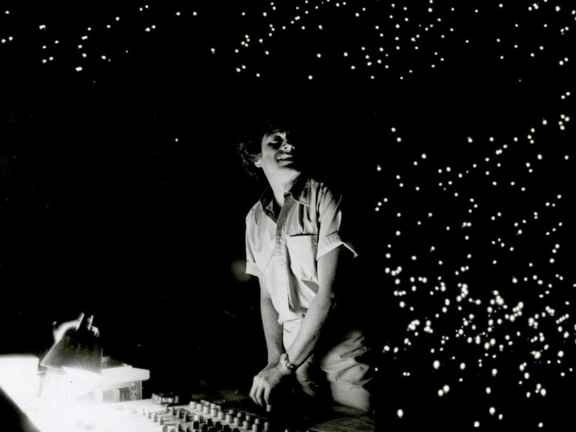
Révolutions Xenakis: film screening and conversation
Event Slider
Date
- / Cancelled / Sold out
Location
Auditorium 3 Calouste Gulbenkian FoundationThe event will be held in french with portuguese translation.
In celebration of the centenary of the birth of the composer, architect, engineer and mathematician Iannis Xenakis (1921/1922-2001), the exhibition Révolutions Xenakis is the starting point for the screening of the award-winning documentary Xenakis Revolution: The Architect of Sound (2022).
The documentary is built around the life and work of the Greek composer, a pioneer in the field of electronic music and creator of the most innovative light and sound shows. It reveals previously unseen archive images, footage of his musical performances and interviews with family members, friends and researchers.
The screening is followed by a conversation with Mâkhi Xenakis, the composer’s daughter and curator of the exhibition, and Benoît Gibson, an expert on Xenakis’s work and author of several studies on the composer, including two essays published in the catalogue accompanying the exhibition.
Speakers
-
Mâkhi Xenakis
Mâkhi Xenakis studied sciences and later architecture, under Paul Virilio. She began by designing theatre sets and costumes with Claude Regy and, in 1989, received a painting grant that allowed her to move to New York, where she met the artist Louise Bourgeois, with whom she worked closely.
In 1999, she carried out her first solo sculpture exhibition. In 2012, she curated an exhibition on her father, Iannis Xenakis, which explored his creative process, leading her to write Iannis Xenakis, un père bouleversant.
She currently splits her time between sculpture, drawing and writing. Her work is represented in collections such as those of the Centre Pompidou, the Manufacture de Sèvres, the Manufacture des Gobelins and FNAC. -
Benoît Gibson
Benoît Gibson studied viola and music theory and analysis at the Conservatoire de Musique de Montreal, Canada, and completed a doctorate on the work of Iannis Xenakis at the École de hautes études en sciences sociales, in Paris.
From 2000 to 2007 he taught at the Escola Superior de Música in Lisbon. He currently teaches music analysis at the University of Évora, where he was head of UnIMeM, Research Unit in Music and Musicology, from 2008 to 2014.
As a specialist, he gave several talks and published many texts about the life and work of Xenakis. His book on the composer’s instrumental music, published by Pendragon Press, is a significant contribution to the understanding of the composer’s creative thought.
Programme
16:00 / Documentary screening
Xenakis Revolution: The Architect of Sound, 2022, 55′
Simultaneously a composer, architect and engineer, Xenakis was one of the most original figures in modern music. A pioneer of computer music, sound and light shows and spatialised concerts, Xenakis still inspires artists working in the contemporary electronic scene today. By telling the story of the man he was, this film clearly shows how this utopian and revolutionary artist developed a unique language encompassing music, architecture, science and mathematics.
Like the utopias of the 1960s, Xenakis’s revolution was total, in political and artistic as well as technological and social terms. Of Greek origin, Xenakis trained as an engineer and fought in the Second World War. Seriously wounded and sentenced to death, he was forced to leave his country, to which he only returned after 27 years of exile.
Xenakis arrived in Paris in 1947 and started working with Le Corbusier on the Convent of Sainte-Marie de la Tourette and the famous Philips Pavilion. His collaboration with the master of modern architecture inspired radical musical works, such as Metastaseis, which was based on his experience of war and completely changed the language of music.
Rejecting both traditional tonal music and avant-garde experiments such as dodecaphony, Xenakis devised a new form of composing with the help of graphic scores and calculations of probability. Driven by the desire to immerse his audience in a total show, the composer broke all the rules of the orchestra and created polytopes, a new art form that was simultaneously structural, visual and sound-based, a precursor of his sound and light shows.
Xenakis was the first European composer to use a computer to create music. From his UPIC system, he invented the first graphic synthesizer, in the hope of making composition accessible to all. Guided by his revolutionary and humanist ideas, Xenakis broke down the boundaries between the arts and sciences and laid the groundwork for futurist, multimedia and transdisciplinary creations. That is why, even if they don’t know it, all DJs on the electronic scene today are descendants of Xenakis.
To help us discover this extraordinary artist, Stéphane Ghez decided to tell the story of the man he was, through the testimonies of those who were close to him and the artists he influenced. On the wild beaches of Corsica, which reminded him of Greece, his daughter Mâkhi describes the influence of nature on his compositions. In La Tourette Convent, his graphic scores come to life and echo his architecture. Pascale Dusapin, George Aperghis and Jean-Michel speak about how his work shook up musical tradition. And the young musicians of the Trio Xenakis, in intense and spectacular musical sequences, demonstrate the vitality of his work.
17:00 / Conversation
Mâkhi Xenakis
Benoît Gibson
Credits
Original title
Xenakis Révolution, le bâtisseur du son
Director
Stéphane Ghez
Cast
Mâkhi Xenakis
Pascal Dusapin
Jean-Michel Jarre
George Aperghis
Michel Tabachnik
le Trio Xenakis
Makis Solomos
Elisavet Kiourtsoglou
Distribution
Cinétévé Sales
Copyright
© ARTE France – Cinétévé – Mâkhi Xenakis, 2022
The Calouste Gulbenkian Foundation reserves the right to collect and keep records of images, sounds and voice for the diffusion and preservation of the memory of its cultural and artistic activity. For further information, please contact us through the Information Request form.

